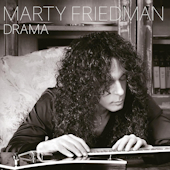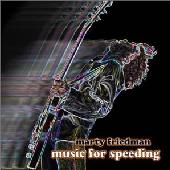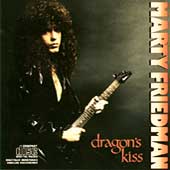



![]()
MARTY FRIEDMAN
![]()
"Drama" (Frontiers
Music; SRL; 2024)![]()

![]()
![]()
Reviewed by Snidermann



![]()
Marty Friedman, guitarist of Megadeth, Cacophony and Vixen, has, for the last couple of decades, has become quite popular for his impressive instrumental guitar work. It takes a lot of guts to write and record an instrumental. It really puts everything right there on the recording; you like it or you don't.
I have to say, I do enjoy instrumental rock guitar music from time to time and, when I ran across this release from Marty Friedman, I thought what the hell and gave it a try. I like instrumental music. It's like cleansing my musical pallet so to speak. But "Drama" is more than just an instrumental recording. There are vocals tracks here, too. Marty teams up with Colombian rock band Apolo 7 and Like A Storm, a rock band out of Auckland, New Zealand.
This recording is simply awesome; full of energy that bleeds from the music and transforms to a relaxing and thoroughly enjoyable rock experience.
By the look of his discography, Marty Friedman has quite the library of musical expression that needs to be explored.
For more information visit http://www.martyfriedman.com/.
![]()
"Music
For Speeding" (Favored Nations; 2003)![]()

Reviewed by Christopher J. Kelter



![]()
After "Scenes,"
"Introduction," and "True Obsession" it didn't seem like fans of Marty
Friedman's work in Megadeth or Cacophony were ever going to get a hard rock album from one of the metal
genre's most acclaimed talents. "Music For Speeding" is Marty Friedman's return to his hard rock and metal roots
without losing any of the non-metal elements he gained along the way.
The first five tracks of "Music For Speeding" certainly live up to the album's title as the tracks are hard charging numbers that pump adrenaline like it was fuel burning through a hot rod's souped-up engine. One might think that these first five numbers bear a strong resemblance to Joe Satriani's classic 'surfing' style. And, given my near unconditional love for anything that Joe Satriani creates, you wouldn't be remiss in thinking that it was an unfair characterization. However, just like Satriani, Friedman manages to put his own personal stamp on his up-tempo work and manages to not only make each song unique compared to other artists, but by also making each song distinctive in its own right.
A couple of milder, somber numbers are stuck in the middle of the disc's sequence. These tracks should give listeners a taste of Friedman's other solo works where the focus was on more sedate music rather than the style he's known for in hard rock and heavy metal circles. I say this because I know there are a lot of Megadeth fans that probably are still reluctant to consider Friedman's solo work at all.
The latter half of the album, save for the track "Corazon de Santiago," dives right back into aggressive styles. Basically, Friedman sticks to genuine, hard rock songs yet manages to make the second half sound completely different that the first half. The songs add a diverse set of musical influences that gives "Music For Speeding" a lethal splash of Technicolor vibrancy.
"Music For Speeding" contains a flair for the dramatic as well as an overall sense of purpose. While music fans who don't care for instrumentals may still not find anything to like in Friedman's work there are plenty of reasons why fans of the instrumental genre can appreciate Friedman's impressive work on "Music For Speeding."
In its entirety, "Music For Speeding" reminds me a lot of the variety of sounds and styles that Vinnie Moore captured with his criminally underrated album "Meltdown." As such, it's easy to say that "Music For Speeding" is a wonderful showcase of Marty Friedman's exquisite and varied six-string talents. Just don't expect "Music For Speeding" to be a carbon copy of his previous work as a neo-classical fusionist (early solo works, Cacophony), thrasher (the Megadeth discs), or new age noodler ("Scenes").
"Music For Speeding" was produced by Marty Friedman.
Marty Friedman was joined by Jimmy O'Shea on bass, Barry Sparks on bass, Brian Becvar on keyboards, James "Jake" Jacobson on synthesizer, and Jeremy Colson on drums.
For more information visit http://www.martyfriedman.com/.
![]()
"Dragon's
Kiss" (Shrapnel; 1988)![]()

![]()
![]()
Reviewed by Christopher J. Kelter



Before Marty Friedman joined Megadeth he was able to put out a solo disc of shredding instrumentals. Friedman joined his compatriots Vinnie Moore, Tony MacAlpine, and Jason Becker in releasing eight songs of neo-classical fusion fury.
Most of the focus here is on the melodies and solos – as such there is a lot to be desired for the rhythms themselves. Just like other neo-classical fusion discs of the late '80s, the key word is 'busy' – more often than not every song has more notes crammed into every second than an Yngwie J. Malmsteen song. The epic and ominous "Evil Thrill" is quite good and "Namida (Tears)" is one of the more effective ballads that I've ever heard in the instrumental genre. "Anvils" is a ready-made case proving that short, blistering songs can be effective and not just album filler.
If you didn't catch the neo-classical fusion wave of the late '80s then "Dragon's Kiss" won’t do much for you. However, if you dig Vinnie Moore or Tony MacAlpine then "Dragon's Kiss" will make a great addition to your collection.
Marty Friedman plays guitars and bass. Marty Friedman is joined by Deen Castronovo on drums and Jason Becker contributes a few solos.
For more information visit http://www2.shrapnelrecords.com/shrapnel.
![]()
Rating Guide:



 A classic. This record will kick your ass.
A classic. This record will kick your ass.


 Killer. Not a classic but it will rock your world.
Killer. Not a classic but it will rock your world.

 So-so. You've heard better.
So-so. You've heard better.
 Pretty bad. Might make a nice coaster.
Pretty bad. Might make a nice coaster.
![]() Self explanatory. Just the sight of the cover makes you wanna hurl.
Self explanatory. Just the sight of the cover makes you wanna hurl.
![]()
| Our writers choose
which products we review on RoughEdge.com, and we may earn an affiliate commission when you buy something through our website. Thanks, by the way! |
Copyright © 2024 by R. Scott Bolton. All rights reserved.
